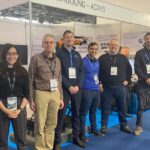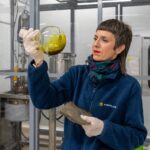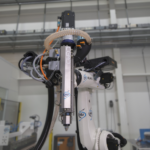Aerospace jobs and supply chains across the UK will benefit from cutting-edge research and development projects announced by the government and aerospace industry leaders. Government grants totalling £200 million, delivered through the Aerospace Technology Institute (ATI) programme, will be matched by industry to create the total investment of £400 million in new research and technology, enabling ambitious projects to lift off and support the sector’s recovery from the coronavirus pandemic.
New projects set to receive funding will include developing high performance engines, new wing designs, ultra-lightweight materials, energy-efficient electric components, and other brand-new concepts to enhance innovation within the sector. A project led by Williams Advanced Engineering in Oxford, for example, will develop ultra-lightweight seat structures that will reduce an aircraft’s fuel consumption. The funding will also secure highly-skilled jobs in the UK’s aerospace sector and will benefit companies of all sizes from Caldicot in Wales to Bedlington in the North of England. Higher education institutions will also be a part of the projects, including the universities of Nottingham and Birmingham.
The funding was announced by Business Secretary Alok Sharma at Farnborough Connect, the virtual version of Farnborough International Airshow. Secretary of State for Business, Energy and Industrial Strategy Alok Sharma said: “We have an incredible aerospace industry right here in the UK that defines the way aircraft are manufactured globally. This £400 million ATI investment will help secure our world-leading position in developing new flight technology to make air travel safer and greener into the future”.
The successful projects that will receive a share of the government’s £200 million grant funding through the ATI programme, and match it with their own investment, include:
- wings: the UK is the home of Airbus wing design and manufacturing. Airbus-led projects (Broughton, Filton) will drive forward more efficient wing assembly, systems installation, digital design processes and a range of innovative wing concepts including folding wing tips
- engines: Rolls-Royce-led projects will support the development of the UltraFan engine technology, which will make a step change in the efficiency and environmental performance of aircraft
- power systems: the AEPEC project led by Safran Electrical & Power UK (Pitstone) will research how new electrical power systems can lead to more efficient energy usage
- cabin systems: an Oxford-based project led by Williams Advanced Engineering will develop ultra-lightweight seat structures for air travel, reducing the weight of aircraft.
Stu Olden, Senior Commercial Manager for Defence, Aerospace & Emerging Markets at Williams Advanced Engineering, said: “A key benefit for us of the ATI support has been to enable accelerated development of the 3 companies involved in the consortium. Additionally, by developing UK technologies and innovation, the ATI programme is enabling UK-based product development and, hopefully, future jobs. For Williams Advanced Engineering it has allowed us to participate in the aerospace sector as a non-traditional supplier”.
During his speech, the Business Secretary also announced the FlyZero initiative to kickstart exploration into zero-carbon emission commercial aircraft. The FlyZero study will receive government funding and bring together around 100 experts to tackle issues involved in designing and building a commercially successful zero-emission aircraft. The study will create a strong basis for further research and development into a wide of technologies necessary for future flight, with the aim of securing future manufacturing in the UK. Gary Elliott, Chief Executive of the Aerospace Technology Institute, said: “FlyZero represents an acceleration of the UK’s ambition to lead the world in green aviation. These are challenging but also exciting times for the aerospace sector; we need to help UK companies to recover while also creating new approaches to technology development and innovation. FlyZero will engage a team of highly-skilled engineers and technologists from across the UK to look into how to design and build a zero emission commercial aircraft, with the solid aim of securing future manufacturing in the UK”.
The UK was the first major economy to commit to achieving net zero emissions by 2050, and over the past decade, the UK has cut carbon emissions by more than any similar developed country. In 2019, UK emissions were 42% lower than in 1990, while our economy grew by 72%.
Projects approved by the ATI’s rigorous assessment programme create opportunities to secure jobs in research and manufacturing across the UK as well as sharing knowledge across industry and academia.
Further background on the projects:
- Airbus projects: Wing of Tomorrow will develop new technologies and manufacturing processes to produce the next generation composite wings and help Airbus’s leading position in the single aisle market. A critical part of the programme is to develop capability to manufacture more efficient, light weight carbon-fibre wings, at a rate much higher than previously possible
- Rolls-Royce projects: UltraFan will be the most efficient engine produced by Rolls-Royce and will use less fuel and produce lower CO2 emissions. Projects funded as part of the £200 million will drive efficiency and contribute towards shared government and industry ambitions on decarbonisation
- Williams Advanced Engineering: the AIRTEK project is focused on developing lightweight seat structures for the civilian aerospace sector. Williams Advanced Engineering, in a collaboration with JPA Design and SWS Certification, is developing new lightweight aircraft seats in order to reduce the weight of aircraft, which in turn will lead to airlines saving fuel and CO2
- Safran Electrical & Power UK: AEPEC: The Aerospace Electric Propulsion Equipment, Controls & Machines (AEPEC) project involves lead partner Safran Electrical & Power UK and its supply chain partners. They will develop electrical power systems to improve energy use on future aircraft, covering power generation, control systems, and other functions on more-electric aircraft.
About the Aerospace Technology Institute
The Aerospace Technology Institute (ATI) is at the heart of UK aerospace R&T. Working collaboratively across the UK aerospace sector and beyond, the Institute sets the national technology strategy to reflect the sector’s vision and ambition. The ATI Programme is a joint government and industry commitment to invest £3.9 billion in research to 2026. In addition to the ATI Programme and FlyZero, the Institute also supports the supply chain through NATEP and aerospace start-ups through the ATI Boeing Accelerator.
Further information:
- small businesses will benefit from the continuation of the National Aerospace Technology Exploitation Programme (NATEP) whose next call is scheduled for October and the launch of the next R&D call for small business scheduled for November.
- at the same time as supporting R&D activities for SMEs the Supply Chain 21 Competitiveness and Growth programme remains open for applications to help businesses improve their competitiveness.
More information: www.gov.uk – www.jeccomposites.com












